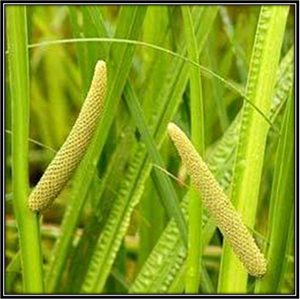ACORUS CALAMUS
 ‘Sweet Flag’ is a herb which has been in use since ancient times due to its medicinal value. The botanical name for Sweet Flag is ‘Acorus Calamus’. It is also known as Sweet Root, Sweet Sedge, Bach-Bach or Myrtle Flag.
‘Sweet Flag’ is a herb which has been in use since ancient times due to its medicinal value. The botanical name for Sweet Flag is ‘Acorus Calamus’. It is also known as Sweet Root, Sweet Sedge, Bach-Bach or Myrtle Flag.
The Hindi name for this herb is ‘Vacha’ while the names used in Sanskrit scriptures for this herb are ‘Vacha’ or ‘Ugragandha’. It was originally grown in Europe.
CHARACTERISTICS OF ACORUS CALAMUS
This herb is a semi-aquatic plant which thrives in marshy and damp places. Although many varieties of this polypoid are available, only the ones which do not contain a toxin called, ‘p-asarone’ is utilized for medicinal purposes.
This herb is an aromatic, perennial plant with rhizomes. The leaves are slender, long, simple and sword-shaped .They rise alternately from the rhizomes and are spongy in texture.
Its flowers are fragrant, small and pale-green. Its fruits are fleshy, three-celled capsules.
The root-stock and dried rhizomes are widely used in various herbal preparations. Herbal supplements containing Acorus Calamus are available as powder, capsule or rhizome.
NUTRIENTS COMPOSITION
Acorus Calamus contains essential oil which is widely used in herbal preparations. Beta-asarone is a major ingredient of this oil. Different species of this herb contain Beta-asarone in varying amounts. In some species, it is completely absent.
The herb contains other ingredients like alpha-asarone, cis-isoelemicine; trans and cis isoeugenil, elemicine and so on. Acorus Calamus also contains other constitutes like acoradin, 2, 4, 5-trimethoxy benzaldehyde, spathulenol, galangin, 2, 5-dimethoxybenzoquinone and so on.
THERAPEUTIC POWERS OF ACORUS CALAMUS
In Ayurveda, this herb is used for improving memory. It is also blown into the nose of coma-patients for regaining conscience. In India, it is a practice to give a mixture containing Vacha powder and ghee on the seventh day to a new-born to enhance speech development and intellect.
Chinese also use this herb for speech development and recovery from stroke. Essential therapeutic uses of this herb are memory enhancement, as aromatic digestive and nerve stimulant. It also finds utility as sedative, re-juvinative and themogenic agent.
SOME OTHER THERAPEUTIC USES OF ACORUS CALAMUS
The extract of heartwood, flowering tops, young shoots, the bark, fruits and the gum of the plant are used to create products for use. These extracts are used as an anodyne, bactericide, refrigerant, detergent, astringent, styptic, masticatory, expectorant, stimulant and as an antiphlogistic.
- As a diuretic.
- As an expectorant.
- As a decongestant.
- As an anticonvulsant.
- As an aphrodisiac.
- As an anti-bacterial agent.
- As an anti-inflammatory agent.
CARE OF AILMENTS
Experimental studies have proven therapeutic effectiveness of Acorus Calamus through various activities like:
- Cyto-protective and anti-ulcer activity: Use of ethanolic extract of the rhizome in rats proved effectiveness in protecting gastro-duodenal mucosa from injuries caused by reserpine, cysteamine or indomethacin. The extract was effective for ulcer index and reduction of acidity and volume of basil gastric secretion. It protects against lesions induced chemically.
- Anti-spasmodic activity: Various experiments on uterus, tracheal chain, bronchial muscles, blood vasculature and ileum showed that Acorus Calamus is an effective antispasmodic and relaxant owing to its essential oil which contains beta-asarone.
- Analgesic activity: Alcoholic and essential oil extracts possess analgesic properies. It also has mild sedative and hypotensive activity.
- Anti-inflammatory activity: On experimenting for chronic and acute inflammation in rats, the extract showed high anti-inflammatory activity up to 44 percent.
- Anticonvulsant activity: Using Acorus Calamus rhizome in a poly-herb reportedly reduced epileptic attacks by almost 50 percent due to Alpha and Beta –asarone which have anticonvulsant properties. In 66 out of 88 cases, continued management relieved the condition completely.
- Anti-bacterial activity: Experiments proved effectiveness of the rhizome extract in inhibiting growth of cultured gram-positive and negative organisms due to presence of essential oil.
PARTS OF THE PLANT USED
The rhizome of Acorus Calamus contains essential oil which is effective in relieving epilepsy, dysentery, intermittent fever, some tumors, bronchial catarrh, flatulent colic and severe diarrhea.
The entire plant is useful in relieving digestive and stomach disorders. According to Ayurvedic scriptures, the ‘rasayana’ is regarded the best for relieving nervous and brain disorders.
The extract in different forms, their dosage and ailments they relieve are:
- Powder: Consuming one teaspoon of Acorus Calamus powder twice a day after meals relieves asthma.
- Capsule: Consuming one Acorus Calamus capsule every day relieves epilepsy and liver disorder.
- Tonic Consuming one to two teaspoons Acorus Calamus every day relieves digestive disorder.
Ayurvedic scriptures have recommended use of this herb for liver and kidney disorders, eczema and rheumatism. It is also used to prepare ‘poultice’ for paralyzing limbs.
SAFETY AND PRECAUTIONARY TIPS WHILE USING ACORUS CALAMUS
Herbal managements can be administered alongside standard therapy only after consulting a practitioner. Acorus Calamus is a safe herb for human-use. Acorus Calamus should be administered with caution in designated dosages since large doses can induce vomiting.
PLANET AYURVEDA PRODUCTS CONTAINING ACORUS CALAMUS
Acorus Calamus is a popular ingredient in Planet Ayurveda products. It is found in the following:
We at Planet Ayurveda offer the best management advice and prescribe herbs, supplements and Ayurvedic medicines made from 100 percent natural ingredients that are completely chemical and preservatives free. Our products are vegetarian and made from the best quality organic herbs. We are proud to proclaim that our products are never tested on animals. Opt for Planet Ayurveda herbal products and enjoy the health benefits in everyday living.



